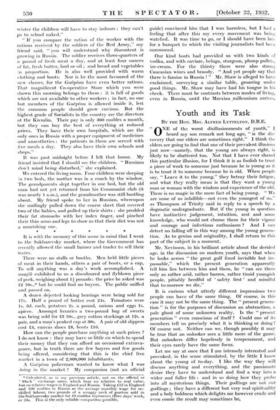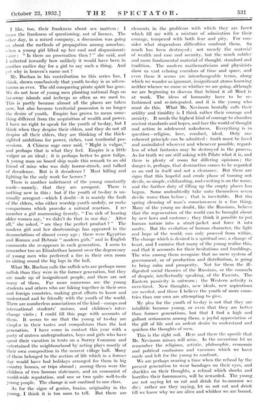Youth and its Task
BY THE HON. MRS. ALFRED LYTTELTON, D.B.E.
" ONE of the worst disillusionments of youth," I heard my son remark not long ago, " is the dis- covery that our elders are sometimes right." I think the elders are going to find that one of their prevalent illusions just now—namely, that the young are always right, is likely to be shattered too. Not that I have ever shared this particular illusion, for I think it is as foolish to trust a piece of work to someone just because he is young as it is to trust it to someone because he is old. When people say, " Leave it to the young," they betray their fatigue, and what they really mean is that they want a young man or woman with the wisdom and experience of the old. There is no magic in the mere fact of being young. " We are none of us infallible—not even the youngest of us," as Thompson of Trinity said in reply to a speech by a dogmatic undergraduate. But if the young in question have instinctive judgement, intuition, zest and some knowledge, who would not choose them for their vigour and courage and infectious enthusiasm ? And I can detect no falling off in this way among the young genera- tion. As to genius and originality, I shall return to this part of the subject in a moment.
Mr. Nevinson, in his brilliant article about the derided age, in the discussion on modern youth, says that when he looks across " the great gulf fixed invisible but im- passable," which the present generation apparently tell him lies between him and them, he " can see them only as rather arid, rather barren, rather timid youngish people, pitiably heedful of ' safety first ' and mindful that to-morrow we die."
It is curious what utterly different impressions two people can have of the same thing. Of course, in this case it may not be the same thing. The " present genera- tion " is for the purposes of discussion an abstraction, a pale ghost of some unknown reality. Is the " present generation " even conscious of itself ? Could one of its members tell us precisely what it is thinking or doing'? Of course not. Neither can we, though possibly it may be true that an onlooker sees a little more of the game. But onlookers differ hopelessly in temperament, and their eyes rarely have the same focus.
Let me say at once that I am intensely interested and provoked, in the sense stimulated, by the little I know about the young of to-day. I like the way they will discuss anything and everything, and the passionate desire they have to understand and find a way into a wider and fuller life : and in so doing how they probe into all mysterious things. Their godlings are not our godlings ; they have a different but very real• spirituality and a holy boldness which delights me however crude and even comic the result may sometimes-be. I like, too, their frankness about sex matters : I mean the frankness of questioning, not of licence. The other day, in a mixed, company, a discussion was going on about the methods of propagation among amoebae, when a young girl lifted up her cool and dispassionate voice " Is there no procreation then ? " she said, and I reflected inwardly how unlikely it would have been in another earlier day for a girl to say such a thing. And vet why in heaven's name not ?
Mr. Buchan in his contribution to this series has, I think, shown conclusively that youth to-day is 'as adven- turous as ever. The old conquering pirate spirit has gone.
We do not hear of young men planting national flags on far-away islands and icebergs as often as we used to.
This is partly because almost all the places are taken now, but also because territorial possession is no longer the desire of youth. Empire has grown to mean some- thing different from the acquisition of wealth and power.
I have no right to speak for the youth of to-day, but I think when they despiSe their elders, and they do not all despise all their elders, they are thinking of the thick- sighted ambitions for power, riches, vast territorial pos- sessions. A Chinese sage once said, " Might is vulgar," and perhaps that is what they feel. Empire is a little vulgar as an ideal ; it is perhaps better to grow tulips. A young man on board ship made this remark to an old friend of mine who was duly horror-struck, and talked of decadence. But is it decadence ? Must killing and fighting be the only work for heroes ?
There is another indictment of the young constantly made—namely, that they are arrogant. There is nothing new in this ; but if the youth of to-day is un- usually arrogant—which I doubt—it is mainly the fault of the elders, who either worship youth unduly, or make comparisons which provoke a natural reaction. I re- member a girl murmuring fiercely, " I'm sick of hearing older women say, ' we didn't do that in our day.' After all," she asked, " are they the perfect product ? " The modern girl and her shortcomings has appeared in the denunciations of almost every age ; there were Egyptian and Roman and Hebraic " modern girls," and in English comments she re-appears in each generation. I seem to remember too an Elizabethan lament over the degeneracy of young men who preferred a fire in their own room to sitting round the big logs in the hall.
What Mr. Buchan calls the raffish sets are perhaps more raffish than they were in the former generation, but they are made up of insignificant people, and there are not many of them. Far more numerous are the young students and others who are hiking together in their own and foreign countries; making great efforts to know and understand and be friendly with the youth of the world. There are numberless associations of the kind—camps and international students' unions, and children's inter- change visits ;. I could fill this page with accounts of them. It seems to me that the young of to-day are simpler in their tastes and compulsions than the last generation. I have come in contact this year with a party of sixteen undergraduates, boys and girls who have spent their vacation in tents on a Surrey Common and entertained the neighbourhood by acting plays mostly of their own composition in the nearest village hall. Many of them belonged to the section of life which in a former day would have had holidays arranged for them in big country houses, or trips abroad ; among them were the children of two famous statesmen, and an economist of world-wide reputation, and one or two quite well-to-do young people. The change is not confined to one class.
As for the signs of genius, brains, originality in the young, think it is too soon to tell. But there are elements in the problems with which they are faced which fill me with a mixture of admiration for their courage, tempered with both fear and pity. For con- sider what stupendous difficulties confront them. So much has been destroyed ; not merely the material of wealth and ease and security, but the much subtler and more fundamental material of thought., standard and tradition. The modern mathematicians and physicists show us vast echoing corridors of time and space, and even these it seems are interchangeable terms, along which we wander as ignorant, insignificant atoms knowing neither whence we conic or whither we are going, although we are beginning to discern that behind it all Mind is at work. The ideas of humanity have to be re- fashioned and re-integrated, and it is the young who must do this. What Mr. Nevinson brutally calls their aridity and timidity is I think rather their courage and anxiety. It needs the highest kind of courage to abandon ancient standards and hopes, and face the world of thought and action in adolescent nakedness. Everything is in question—religion, love, conduct, ideal. Only one coherent principle can be admitted : truth must be faced and assimilated wherever and whenever possible, regard- less of what fantasies may be destroyed in the process.
As for truth we are still asking with Pilate what it is, and there is plenty of room for differing opinions ; the danger is, perhaps, that destruction comes to be regarded as an end in itself and not a clearance. But there are signs that this hopeful and crude phase of turning out devils, so simple, exhilarating, and exciting is on the wane, and the further duty of filling up the empty places has begun. Some undoubtedly take unto themselves seven devils worse than before ; that is inevitable. But the spring cleaning of man's consciousness is a fine thing.
Many of the young no doubt, like the Russians, believe that the regeneration of the world can be brought about by new laws and customs ; they think it possible to-put human nature into a strait-jacket and force it into sanity. But the evolution of human character, the light and hope of the world, can only proceed from within.
The change which is desired is a spiritual one, a change of heart, and I surmise that many of the young realize this, and that it accounts for their hesitations and fumblings.
The wise among them recognize that no mere system of government, or of production and distribution, is going to bring ealm and prosperity. Not for them the ill- digested social theories of the Russians, or the counsels of despair, intellectually speaking, of the Fascists. The Eastern passivity is outworn ; the Western activity is over-tired. • New thoughts, new ideals, new aspirationS are needed, and these I believe the youth of more coun- tries than our own are attempting to give.
My plea for the youth of to-day is not that they arc infallible because young, or even that they are better than former generations, but that I find a high and gallant seriousness among them, a joyful appreciation of the gift of life and an ardent desire to understand and quicken the thoughts of men.
This is the right soil. Here and there the apostle that Mr: Nevinson misses will arise. In the meantime let us remember the religious, artistic, philosophic, economic and political confusions and vacuums which we have made and left for the young to confront.
We are perhaps nearing a time when the refusal by the present generation to wear bandages on their eyes, and shackles on their thoughts, a refusal which shocks and horrifies their forerunners, will be rewarded. The young are not saying let us cat and drink for to-morrow we die ; rather are they saying, let us not eat and drink till we know why we are alive and whither we are bound.















































 Previous page
Previous page